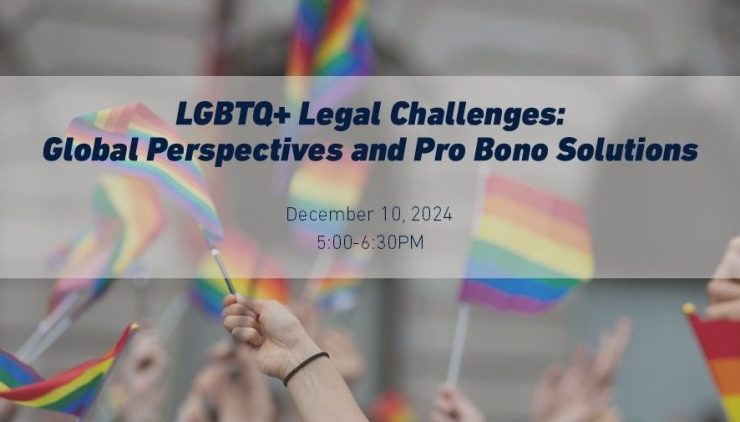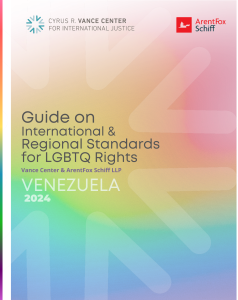This website uses cookies so that we can provide you with the best user experience possible. Cookie information is stored in your browser and performs functions such as recognising you when you return to our website and helping our team to understand which sections of the website you find most interesting and useful.
Vance Center Marks Human Rights Day with Event on LGBTQ+ Rights and Pro Bono
December 2024On December 10, the Vance Center hosted a virtual event exploring some of the significant legal challenges impacting LGBTQ+ communities around the world.

The discussion, titled “LGBTQ+ Legal Challenges: Global Perspectives and Pro Bono Solutions,” brought together experts from a diverse range of backgrounds to highlight and discuss the legal challenges faced by the LGBTQ+ community globally, explore international human rights laws concerning LGBTQ+ rights, and share best practices from different regions to promote equality and justice.
Human Rights and Access to Justice Program Senior Staff Attorney Romina Canessa and Pedro Reyes, Partner at Baker McKenzie and a member of the Vance Center Committee, welcomed attendees to the discussion.
They were followed by a video address from Graeme Reid , United Nations Independent Expert on Sexual Orientation and Gender Identity. In his remarks, UNIE Reid expressed concern about the proliferation of “restrictive laws” such as so-called “gay propaganda” or “promotion of homosexuality” laws.
“What all these do is to restrict the expression of identities in the public domain and curtail the ability of LGBT groups to do their work,” he said. “And very often these laws and restrictions are justified by hostile political rhetoric that situate LGBT people as a threat to the social order.”
He also noted the challenges raised by increased political polarization on issues of gender and sexuality, around the world and within the UN system, which allow authoritarian populists to attack vulnerable minority groups “as a means to a broader political end” and can result in echo chambers.
Moderator Pedro Reyes then introduced the evening’s speakers:
- Rasha Younes, Interim Director of the LGBT Rights Program at Human Rights Watch
- Maya Cohen and Mario Torrico, Associates at ArentFox Schiff LLP
- Wilmer González Colina, Human Rights Lawyer and advisor to Venezuelan human rights NGOs, former Vance Center Program Advisor
- Micheal Ighodaro, Co-founder and Executive Director of Global Black Gay Men Connect, President of Global Black Pride and advocate for LGBTI rights and HIV prevention
- Dr. Meredithe McNamara, Assistant Professor of Pediatrics and specialist in Adolescent Medicine, Yale School of Medicine
The panelists covered a wide range of topics, drawing on their professional and personal experiences. Speakers shared specific examples from contexts including Venezuela, Uganda, the United States, and Iraq, noting parallels across jurisdictions and unique challenges between them.
Guided by questions from Reyes, the panelists covered navigating laws that criminalize LGTBQ+ people and how these laws affect advocacy efforts on the ground, the role of international human rights frameworks and pro bono networks in challenging discriminatory laws and advancing equality, the impact of disinformation, and how law firms can ensure that their pro bono efforts are responsive to the needs of marginalized communities.
The conversation featured several recent Vance Center projects related to LGTBQ+ rights. HRW’s Younes and Dr. McNamara spoke about their work with an ongoing project to produce memos on policies pertaining to gender affirming care in 44 countries around the world, which the Vance Center has coordinated along with co-counsel law firm Morrison Foerster.
González and the ArentFox lawyers, Cohen and Torrico, also discussed a recent project that produced a guide on international and regional standards for LGBTQ rights in Venezuela.
Younes of Human Rights Watch stated that criminalization of same-sex relations “remains a very real challenge in in accessing justice for LGBT people worldwide.” She pointed to examples like the Anti Homosexuality Act in Uganda, systemic discrimination in healthcare or housing, and lack of access to judicial systems to advocate for the rights of LGTBQ+ individuals, and noted many structural barriers are still present even in countries that don’t directly discriminate against LGTBQ+ groups.
“In many contexts, the law only solidifies already pre-existing violence and discrimination and adds insult to injury by rubber-stamping lived experiences with legal sanctions that allow for this violence and discrimination to continue as normalized and with complete impunity,” she said. “The result is a complete chilling effect on civil society organizations working on gender and sexuality.”
Citing the gender-affirming care project, she emphasized the value of documentation and presenting “legal facts that counter misinformation and disinformation around issues that have gained this kind of political prominence for the wrong reasons.”
Studying legal frameworks and comparing different legal approaches helps develop a comparative framework to advocate for tailored strategies and provide resources for activists.
“Legal memos give us the ability to debunk and present a rebuttal,” she said.
González offered context for the Venezuela guide, which he helped develop while working at the Vance Center. The document aims to respond to a lack of initiative and capacity to document human rights violations impacting LGTBQ+ communities by creating a tool that activists and advocates could use to bring cases to international attention.
He outlined some of the challenges for NGOs in Venezuela, including limited funding and brain drain as talented lawyers leave the country, leaving the remaining organizations with fewer resources and less capacity to document and respond to cases. He pointed to the valuable role of pro bono legal services to address some of those gaps, and how bringing in legal experts can build mutually beneficial relationships between NGOs with little legal expertise, victims of human rights violations, and international pro bono lawyers with the knowledge to help others navigate these systems.
“Law firms have the ability to understand complex legal issues that victims cannot,” he said.
The ArentFox team shared more details about developing the Venezuela guide and insight on how lawyers can engage with pro bono efforts within their firms. Torrico emphasized the responsibility of legal practitioners to use their knowledge to respond to developments like discriminatory laws, and suggested developing subject matter or regional areas of expertise for pro bono work. Cohen pointed to the knowledge loss that occurs when laws or governments restrict civil society groups and suggested how international lawyers can help create change at national levels.
“It was really great to be able to pull in those resources and see the real-life impact that international [effort] can have domestically as well,” she said.
Dr. McNamara discussed her work on the “nexus between scientific disinformation and LBGTQ health,” including studying how “distortions and falsehoods justify deep government overreach” into private medical decisions between patients and healthcare providers. She described the harmful effects of disinformation on advocacy groups, describing how it erodes their capacity and distracts from their missions.
“What we’ve seen here in the US over the past couple years is many of the legal advocacy groups devoting enormous attention to just rebutting bad faith information,” she said. “The presence of disinformation forces advocacy groups into areas that they really don’t know how to operate in.”
She added that experts collaborating across fields–medical, research, legal, academic–offers one way to address this challenge.
“It’s been really amazing working with attorneys in the movement and pro bono firms, both to inform academic projects and then to support legal challenges,” she said.
Ighodaro outlined the limitations and benefits of legal frameworks for informing advocacy, and emphasized how laws in one jurisdiction can have an effect in other countries. He offered an example from Uganda, where a decade ago activists pushed back against an earlier version of the anti-homosexuality law, only to have it return “with a different style.” The law has influenced legislation in places like Tanzania and Ghana, emboldening other countries to “take the Uganda playbook and sort of restructure it, revamp it and put your own idea into it.”
While the spread of these laws poses a threat to LGTBQ+ communities, Ighodaro also noted that it can offer an opportunity for activists to coordinate strategies, learn from one another, and take proactive steps to protect other jurisdictions before they implement these laws.
In addition to generally discriminatory laws and structural barriers, Ighodaro pointed to the effects of institutional racism and laws that impact targeted populations, such as a federal rule that banned immigration and travel to the United States for non-U.S. citizens living with HIV/AIDS until 2010.
He called on the international legal community to be more willing to take on challenging pro bono cases, and to respond to restrictive legislation by offering expertise and time, not just money.
“Giving money is important, but advocating and speaking out and learning about what’s actually going on is crucial,” he said.
The session closed with questions from audience members and a call for attendees to continue engaging in pro bono support and advocacy on LGTBQ+ rights.



